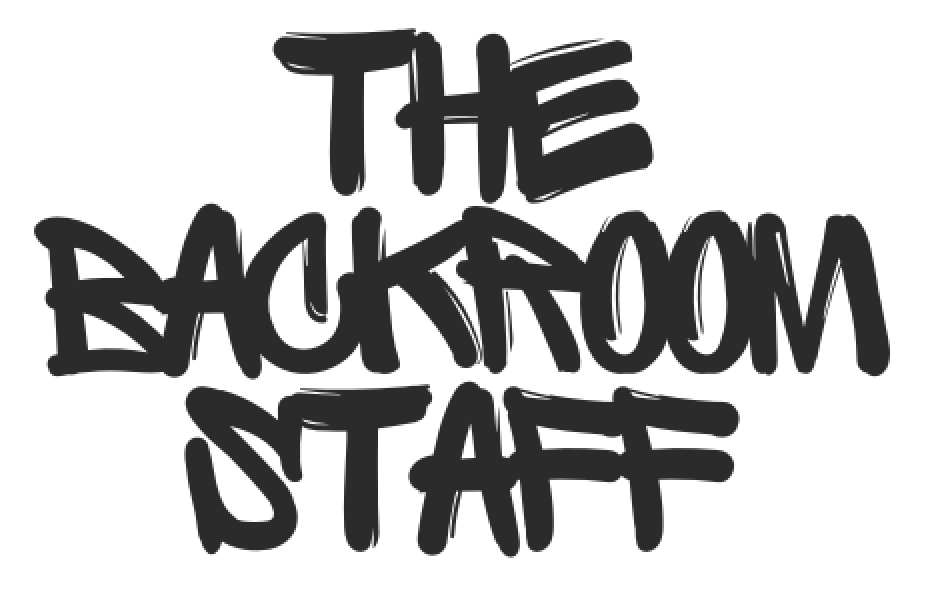Doreen Nabwire shares her groundbreaking journey in football. As a player, she overcame huge barriers to become the first Kenyan woman to play professional football in Europe, while also becoming captain of the Kenyan National Team.
After injury forced her to end her playing career, Doreen moved into football administration, taking roles at the Kenyan Football Federation and FIFA, specialising in women’s football development.
Her work has been instrumental in some of Kenyan women’s football’s biggest accomplishments in the last decade. Now, she works full-time at FIFA, helping more countries make the changes required to empower women and grow women’s football around Africa and the world.
The interview has been condensed and lightly edited for grammar and clarity.
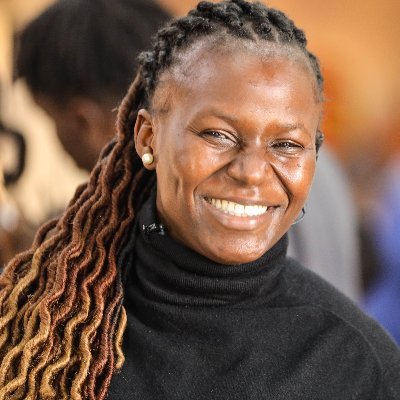
[ First steps in football ]
My life is all about football. I started playing football when I was 8 years old. There were no girls’ teams at the time, so I just kicked the ball around in the street with the boys in the neighborhood. When I was almost 10, a man discovered me playing in the streets and said, ‘you’re really good, we need to find you a team!’
He worked for a young organization, MYSA (Mathare Youth Sports Association), and was already running some boys’ football teams but they wanted to have the same number of girls’ teams - quite a challenge - but he told me he wanted to form a girls’ team and he wanted me to be on the team. I wasn’t sure my mom would let me play, she was happy seeing me playing outside the house but joining a team was something else. But my older brothers were already playing football in this organization, so I thought I would just join and see how it plays out.
We trained at a primary school near our home but my mom noticed me disappearing and she was not happy I was playing football. I used to get a beating every time I came back home but I enjoyed my time on the pitch, so I didn’t mind the beating. I got used to it and I couldn’t stop going to football training and matches.
[ Permission to play ]
We ended up having a good team and we were in a championship and we had a semi-final match about 10 kilometers away from where we lived and I knew the team was depending on me - and that my mom wouldn’t let me go. The day of the match I asked the whole team to come to my place. I thought that she would be moved, or convinced, by seeing other girls my age who also played football and that it wasn’t just me.
My mom had given me some chores but my teammates and the captain tried to request permission from my mom. And my mom was like, ‘no, Doreen is not going anywhere. She's actually doing dishes, so you guys have to go’. My dad was also home on this day and the commotion woke him up and asked what was happening? My captain explained we were a football team and we have a very important match, and we need Doreen to come!
To my surprise, my dad was so excited about this news - he was so happy about it. He asked, ‘how come I’m only learning about this today?’ This was not unusual, growing up in Mathare we faced so many challenges and in many households parents really didn’t know much about what their kids were involved in. They were busy trying to make ends meet or just looking for ways to survive. Our parents missed a lot of our childhood. So it was no surprise that my dad didn’t know I was playing football or that I was even interested in football.
He encouraged me to go and said, ‘please make sure you invite me to the next match!’ That’s the flip side of an African family setup, the father has the say, so if he says it’s okay, my mother wouldn’t challenge and she couldn’t stop me anymore. I left the dishes and ran out with my teammates - we won the match and my dad became my biggest fan, he’s followed me everywhere I’ve played.
[ Norway Cup and playing at the next level ]
At the age of 12, I got my first opportunity to participate in an international tournament with MYSA. They had organized trials for a U14 team going to the Norway Cup in 1999 and I made the final squad. In 1999, we were eliminated in the quarterfinals. The next year, I made the team again and we reached the finals where we lost to a team from Sweden. I was selected again the following year and this time we beat Sweden in the final! I was awarded best player of the tournament.
I slowly started believing that I could be even better and reach new heights. When I joined high school, I helped my team win the school championship at provincial, national and East African level.
After high school, I got scouted by some universities from the US - Park University was among them, and I was to go on a football scholarship, a full ride. But unfortunately, I never got a visa. I applied 3 times for a visa but I never got it. Still, I never felt bad about it and maybe it was a blessing in disguise because something better was coming.
[ The long road to a professional career ]
In 2006, I got the opportunity to represent Kenya in the Street Football World Cup in Berlin. It was small sided and our team had 2 girls and 6 boys - and I helped my team win!
From there, things just started opening up for me. I was selected to participate in the World Cup Draw, in Durban, South Africa for the 2010 World Cup. In Berlin, I also met Herbert Ostwald, a German who lived in Kenya and was back in Germany for summer holidays. He approached me, told me he lived in Nairobi with his wife and son and that his son goes to a German school and would I be interested in working with the young kids at the school as a coach.
So, Herbert connected me with the German school and I started training the kids there. I’d deliver a few drills and at the end, I’d always play with them. Herbert thought it was a waste that I was so good but there were no opportunities in Kenya for me to play, nothing from the federation or organized competitions, not even a league. He started looking for opportunities for me to play in Germany and organized trials with a few clubs including Leverkusen and Essen. They were always interested but the problem was they couldn’t sponsor a work permit. Women’s football wasn’t so developed and players couldn’t be fully dependent on their playing career for income. Even at the big clubs like Wolfsburg, many players were employed at Volkswagen to make a living.
[ Werder Bremen ]
Then, luckily, in early 2009, I met Willy Lemke (Rest in Peace). He was the former president of Werder Bremen for 18 years. At the time he was an advisor to the former UN Secretary-General Ban Ki-moon on Sport for Development and Peace.
Willy Lemke had the idea to identify young role models in African countries and empower them so they can empower young people within their communities. When he shared this idea at the UN Conference, 3 people recommended me - the late founder of MYSA Bob Munro, the half-sister of Obama, Dr. Auma Obama and the German Ambassador to Kenya.
So, he was like, this girl has been highly recommended by 3 very important people, I really want to meet her. I was invited to a dinner they were having and we spoke, instantly he was like you’re the one I’m looking for! He said he would set up a trial with Werder Bremen and if I made it, he’d find a way for me to stay and play football there. And if I didn’t make it, he’d find something else for me to do in Germany anyway, like an internship or something where I could learn a few skills and bring them back to Kenya to help young people. I was okay either way!
He organized the trip to Germany and the trials at Werder. In the first training, they were like, ‘we want her!’. The next day, we had a preseason friendly and I think we won 6-0, I scored 3 goals and assisted 2 more. That’s how I ended up at Werder Bremen.
I played one season there. Everything was new for me, the winter, culture, language, everything but I managed to survive and was named the 2nd best player of the season and tied top-scorer. It was a good season but unfortunately, I couldn’t stay at Werder longer because of new permit issues.
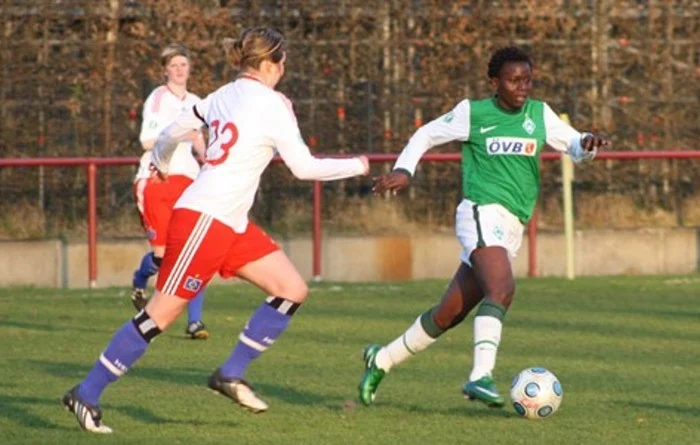
"we had a preseason friendly and I think we won 6-0, I scored 3 goals and assisted 2 more. That’s how I ended up at Werder Bremen"
[ The Netherlands and the end of your playing career ]
Before Werder could figure my permit out, I got the opportunity to go to the Netherlands to do the UEFA C coaching license. I was already into coaching and had done several basic and advanced courses. This opportunity was fully sponsored by the Dutch federation, the KNVB. I ended up in Zwolle and played for FC Zwolle in the Dutch first division while I did the UEFA license.
After the Netherlands, I came back to Kenya for a few months before going back to Germany with FC Köln. Unfortunately, I suffered a very serious injury - I completely ruptured my Achilles tendon at the beginning of the season. It took me a whole year to recover and I came back to Kenya, where I started transitioning into football administration.
[ Around the time you joined Werder Bremen, you also started Girls Unlimited, how did this begin? ]
My former club, MYSA, had a semi-professional women’s team from 2002-2008 - where I’d been among the pioneer players in this team. Then in 2008, the organization came up with new policies and decided to make an age restriction for the team of under 21. This left out like 70% of my teammates, who were above this age. We didn’t earn much but it was sufficient to keep us going, even to live off of and most of these girls depended on their earnings.
So when they left out all these girls, some of them became completely stranded. They didn't know what to do anymore. Their whole lives they had played for mYSA and they never saw the end coming so abruptly. They didn’t have an exit plan. I was not even 21 yet but it was so painful to see everybody - people we had grown together for a long time - leave.
For me, the saddest and most painful was one of our best players, who decided she had no choice but to go into prostitution. She had been orphaned at a very early age, had never studied and had a brother who depended fully on her and she had no way out and decided this was the easiest way. This was not unusual in our community. If you were not busy in Mathare, you could easily engage in drug abuse, crime and prostitution.
So when she opted for that, I felt so bad. We had learned a lot at this organization, we had impacted so many other young lives, other young girls were looking up to us. We felt, if I disappear, the young girls we were coaching would disappear and everything we’d learned - all the crucial and critical things - would go to waste.
I founded Girls Unlimited with a couple of teammates around 2010 to keep this group together and continue nurturing and inspiring other young girls. Unfortunately, in the beginning, we had nothing to offer these girls. We wanted to continue the good work we were doing but at the end of the day, these people need something to eat and I had no means to provide for that.
Still, some people came on board and we continued. It’s been a struggle to keep going and sustain it. We do several activities like themed tournaments, like ’back to school’ tournaments where we provide learning materials to kids who participate. We do life skills to try and keep them off the streets, keep them busy and encourage them to just follow their dreams and play football. We also started a league targeting girls in schools.
The idea is to ensure they are busy and don’t find time to engage in vices when they go back home! They go back home already tired, they can just do their homework, their house chores and wake up for school the next day.
We've been on and off for some time because of a lack of funding. This is something that has been a real thorn in our flesh. I’ve learned that for your organization to be recognized, supported and to get donor funding - you have to be known by certain people and they have to endorse and recommend you.
I had an experience with GIZ for example, where I was introduced to them and developed a good relationship with the leadership for GIZ at the time. Still, they told me, ‘Doreen, your organization is still very small and it’s not possible to partner with you until you grow more.’
This was a very heavy disappointment. How can we grow without any resources or funding? I stopped applying for funding and all that around that time because the story was always the same. We’ve found different ways to get some sponsors and donations but it’s still always an issue.
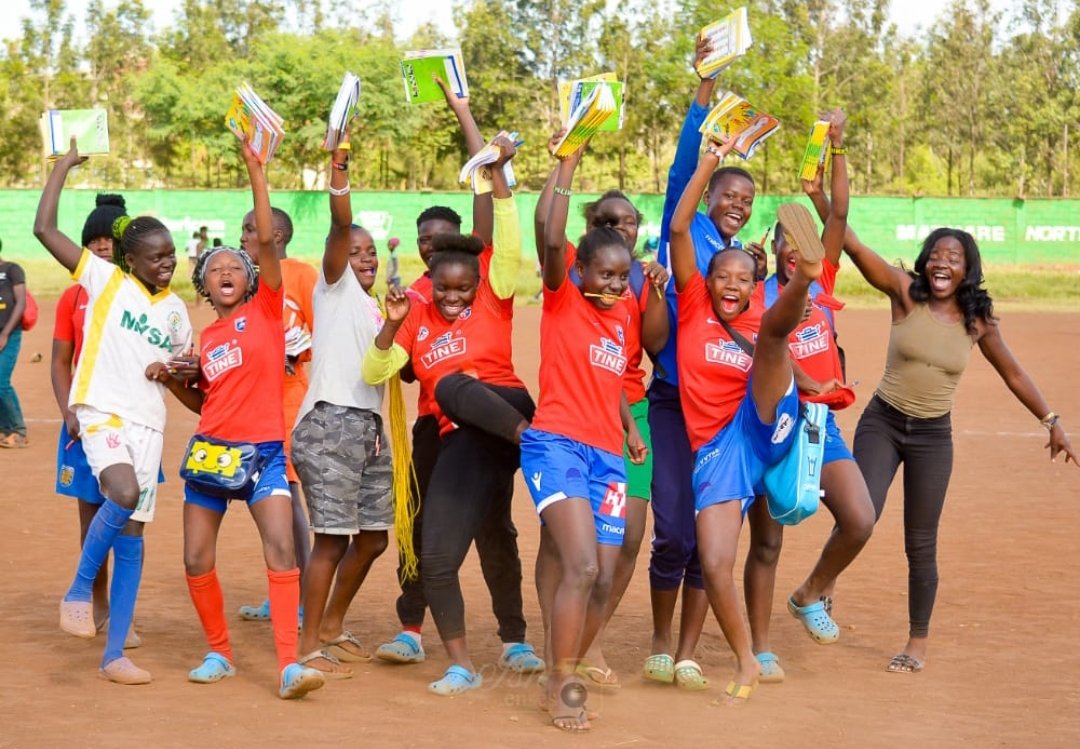
[ After your playing career you became Women’s Football Development Officer at the Kenyan FA - did this role exist beforehand? ]
It did not exist before I joined! In 2015, we had football elections and got a new president. I had personally endorsed him because I felt we needed leadership that would look into development holistically - for both boys and girls. He was the ideal candidate and he seemed to have the women’s agenda at heart. When he won, they onboarded me into the team and this role was created.
I served at the Federation as Women’s Development Officer from 2016, and then in 2021 I was promoted to Head of Leagues and Competitions in addition to overseeing the women’s side - a role I had until November last year.
Now, I’m not currently part of the Federation anymore. In 2022, I was onboarded at FIFA as an expert to assist with women’s football development programs and had been doubling up but now I’m working full-time now with FIFA as a consultant.
[ How does FIFA’s - or Kenya’s - women’s development strategy look in practice? ]
For me, being appointed as the Women Development Officer at the Kenyan FA was a dream come true. I knew the challenge. I knew where we were coming from and I had ideas.
At the time, the leadership was very motivated to do something in women’s football and they gave me a free hand to try and come up with ideas and leverage any support from FIFA. In 2016, the Infantino administration came in and FIFA restructured the women’s football department and appointed a Chief of Women's Football with the goal of developing women’s football globally.
When FIFA launched their women’s football strategy in 2020, they came up with 8 critical development programs related to grassroots and league development. I took advantage of this and applied for all the programs! We were able to implement programs that helped us achieve remarkable things like the U17 women’s team becoming the first Kenyan team ever to qualify for the World Cup.
Now, we have a youth structure in place in Kenya from U13 up to the Women’s Premier League, including a clear league structure encompassing 4 tiers. When we founded the league, we started with 12 teams, split into two zones of 6. Then, we kept building it up and unified the league. Players from the league started to make up the national teams and that same year, our national teams qualified for their very first international competition - the Women’s Africa Cup of Nations.
The results in the national teams are a result of the work that has been done in the past 7-8 years to grow and develop the game at all levels.
"being appointed as the Women Development Officer at the Kenyan FA was a dream come true. I knew the challenge. I knew where we were coming from and I had ideas"
[ Do you think there’s a ‘blueprint’ to grow football - and women’s football specifically - or is each country so different that they require completely unique approaches? ]
Comfortably, yes. FIFA was very deliberate when they launched their women's football strategic plan. The initial one from 2020-2024, has since been reviewed and updated for 2025-2027. They knew, that for them to change the game globally, they needed support from all the member associations.
One of the key parts of the strategy that FIFA put in place is support for all members to come up with their own strategic plan or ‘blueprint’ covering grassroots all the way to the elite level. A lot of these reports and plans are public - the most crucial one is the benchmarking report. This looks into the different leagues across all several member associations and is available for every member association to access. So if I want to benchmark with Belgium or Germany, the report is there. I can look through it, learn from it and see what can be applicable in Kenya.
FIFA has also enhanced all the programs and added more funding to them. For example, if you want to improve your league, there's a league development program that comes with $100,000 you can apply for.
Before applying for any of these programs, the FA needs to have a women’s football strategic plan. If they don’t have one, FIFA can support with experts to help you come up with a plan.
I took full advantage of these programs after they were launched in 2021.
[ Is assisting other FAs part of your role as a FIFA expert? ]
Yes, part of my role now is reviewing applications for these programs. If there’s anything missing, I reach out to them and advise them and assist them with the process. Once their application is approved, I assist different member associations in Africa with the implementation of the FIFA Women’s Football Development Programs.
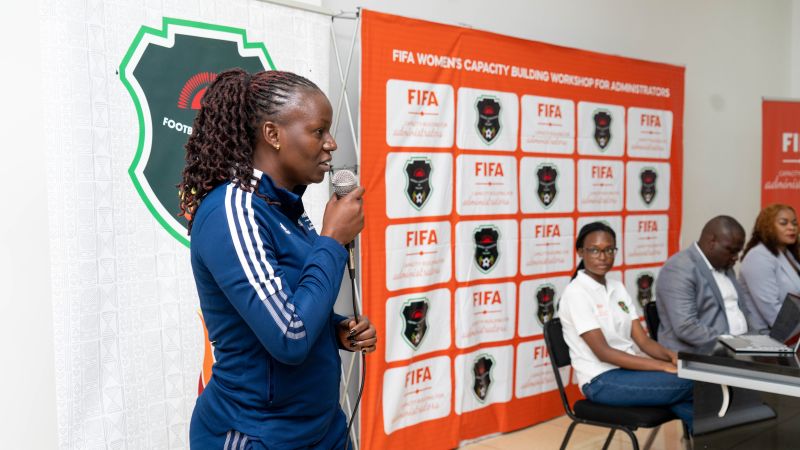
[ Do you think you would be (or could be) as effective in your work if you didn’t play football at a high level yourself? ]
Hmm, I am not so sure. I think probably I wouldn’t be as effective. The experiences and insights from my career definitely give me an advantage over someone who hasn’t played. When I was transitioning into administration, my past made it easier to understand what we needed to do and where we wanted to go.
When I was playing, we had no opportunities - so my biggest goal was to create new opportunities. My generation and the generation before me was completely wasted. My biggest objective was to ensure that the upcoming generations get a platform, get to be exposed and compete. I already had this in my mind for a long time, so putting my ideas down on paper and implementing them was easier for me. As I said, football has been my life.
"My biggest objective was to ensure that the upcoming generations get a platform, get to be exposed and compete. I already had this in my mind for a long time, so putting my ideas down on paper and implementing them was easier for me"
[ What is the biggest difference in women’s football in Kenya since you started playing? ]
If I use my own example, as I told you, when I was starting, my mom wouldn’t allow me to play. Today, she's the biggest beneficiary of my play - of everything I do in football. If she had known better she wouldn't have stopped me! But back then it wasn’t just my mom, a lot of parents would not allow their daughters to play football. This has since changed, it’s changed because they have seen that the game is growing, and a lot of women - including myself - have changed their whole lives through football.
Growing up, I used to tell myself, ‘yes, I was born in the slum but the slum was not born in me’. I was determined to do everything in my power to use the game to change my life and the life of my family. I was able to move out of Mathare because of football. It happened for me and I have been able to inspire other young players and convince some parents that they need to support their daughter and allow her to play football. A lot of parents are the ones looking for opportunities for their daughters to play, that’s a big change and improvement.
[ What are the biggest challenges still facing women’s football in Kenya today? ]
The lack of funding. It remains a struggle to get partners or investors on board. There are many factors involved but getting that one person to believe in the product and say, ‘now we are going to invest in this’, that would be a game changer.
This is something that FIFA knows a lot of countries are struggling with. As part of the new programs, they will assist member associations in coming up with commercial strategies as well. This is an area that Kenya really, really needs to look into - solving this could help Kenya become a football powerhouse in Africa and in the future, the world.
